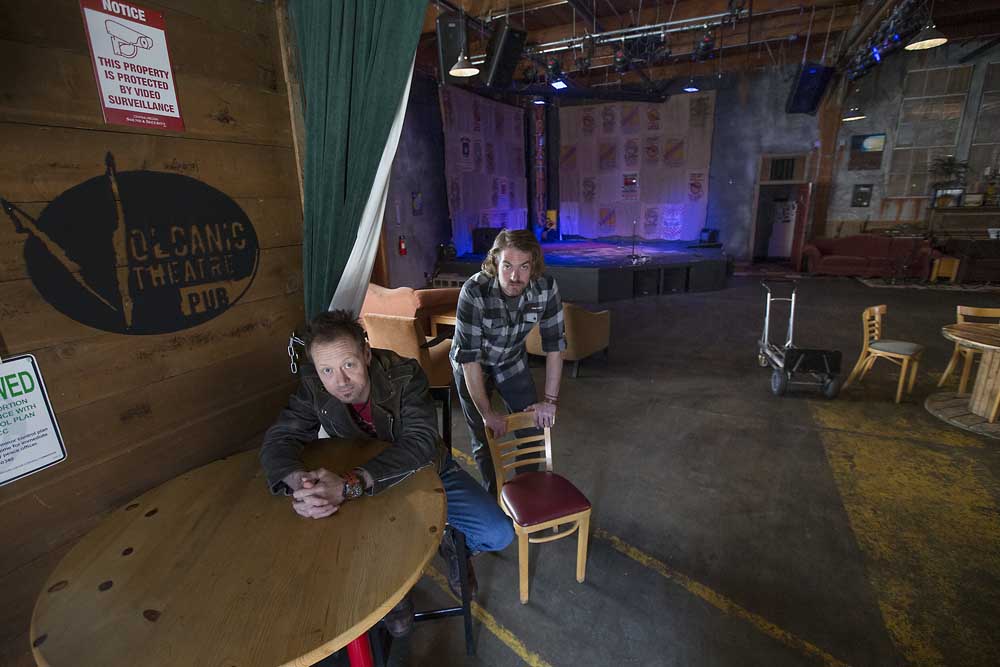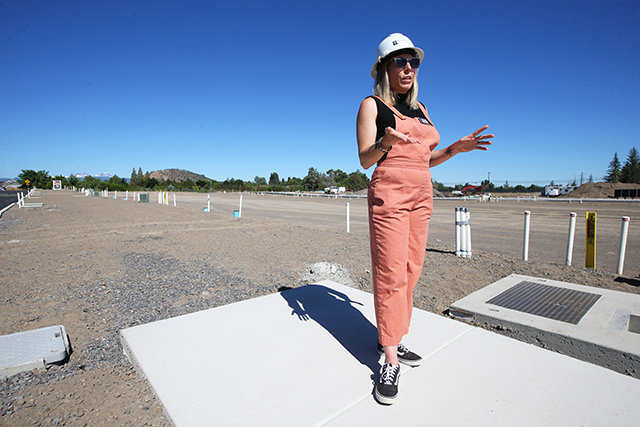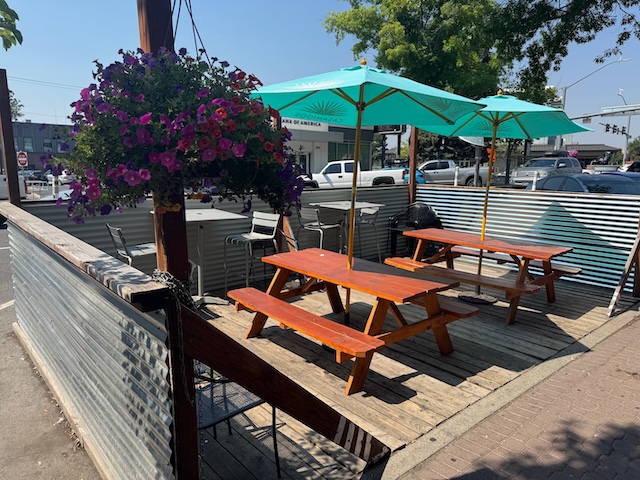Bend’s music industry struggles amidst coronavirus shutdowns
Published 5:00 am Thursday, March 19, 2020

- Derek Sitter, left, owner of Volcanic Theatre Pub in Bend, and sound engineer Phil McIntire pictured in the west Bend venue. Ryan Brennecke/The Bulletin
Volcanic Theatre Pub sold out a show featuring Bend bands Juju Eyeball and Aladinsane on March 6. The next two shows at the venue — Hot Snakes on March 7 and Ballroom Thieves on March 8 — were “heavily attended,” owner Derek Sitter said.
A week later, Volcanic Theatre Pub closed its doors after all shows through April 5 were postponed or canceled.
Trending
“My entire perspective and outlook is upside down,” Sitter said. “That was just a week ago — that’s how fast it changed. I was looking at forecasting one of the busiest springs ever, and in one week that’s all gone.”
The theater is one of many Central Oregon live music venues to go dark because of COVID-19. Gov. Kate Brown on Tuesday announced a four-week ban on events of more than 25 people. Similar bans are in effect in Washington, California and beyond.
Live music events have been shutting down worldwide in an effort to contain the spread of COVID-19. The multiday music and arts festival South by Southwest in Austin, Texas, scheduled for March, canceled for the first time in its history, while Coachella Valley Music and Arts Festival moved from April to October. Tours that were scheduled to arrive in Bend and have subsequently been canceled include The Allman Betts Band, Metalachi, Agent Orange and many more.
A story published March 11 on rollingstone.com with the headline: “‘Everything Is in Chaos’: The Concert Business Stands to Lose Billions From Coronavirus.”
Lost income
Central Oregon venues and independent contractors could lose hundreds of thousands of dollars from event cancellations.
Trending
Portland-based advocacy group MusicPortland (musicportland.org) circulated an online survey Friday evening titled “COVID-19 Impact on Oregon Musicians.” By the 5 p.m. Monday deadline, 988 musicians and independent contractors in the music industry in Oregon had filled out the survey, including 21 respondents in Deschutes County.
The data was presented to the governor Monday in order to advocate for relief for these workers, according to MusicPortland Executive Director Meara McLaughlin.
Estimated loss of income from canceled performances in Bend is more than $36,000, according to data collected in the survey and provided to The Bulletin by MusicPortland. Survey responses also indicated a $53,000 lost investment on canceled performances and more than $87,000 in independent contractor losses, according to MusicPortland.
“My organization has been created to look at the independent or, finger quotes, ‘popular’ music industry that falls between the cracks,” McLaughlin said. “It’s not considered the arts, and it has never organized itself enough to be considered small business or an industry unto itself. In normal terms, it doesn’t have the kind of leverage it needs to advocate for proper policy, and in a situation like this, it really hasn’t established itself as a group that needs to be considered when they’re doling out relief.”
All March, April and May shows hosted by Bend-based promoter 1988 Entertainment will be rescheduled to dates in summer or fall, owner John Davis said. He estimated the gross revenue of these shows at $200,000.
“We had just picked up The Wood Brothers for a one-off (March 11) because they had to cancel their Washington show,” Davis said. “We had that show; luckily it sold out, which was really nice. But while that show was happening, everyone of course was talking about what’s going on — all the staff, the techs, everything like that. And then it switched from that to everybody being like, ‘Did you see what the governor just announced?,’ while we have a sold-out show.”
Sitter estimated Volcanic Theatre Pub could lose between $60,000 and $80,000 for canceled shows in March and April. Shows beyond April 5 are starting to pull out, including Agent Orange on April 22. As an indoor venue, Volcanic sees most of its business in March and April, before the outdoor concert season starts in Bend. The venue employs anywhere from six to 10 staff per show, including independent contractors.
“If you’re grossing a certain amount of money each year, and you know March … and April are statistically your biggest months of the year,” Sitter said, “just remove those two months and now you’re going into your slow season. It’s devastating to the business (and) for the entire industry. It’s the artists, it’s the crew, it’s the tour managers, it’s the venues — it’s gonna get hit hard.”
‘It’s gonna hurt everybody’
The Midtown Ballroom and the Domino Room have canceled or postponed all events through April 15, owner Jim Dickey said. Local promoters such as 1988 Entertainment and Parallel 44 Presents, as well as out-of-town promoters such as JMax Productions, frequently book shows at the venue. Dickey has about a dozen employees on payroll, and sound engineers are contracted through the show promoters, he said.
“My payroll’s very small, probably less than your average restaurant because we’re not open that often,” Dickey said. “But yeah, everybody’s being affected all the way around. I know my sound engineers are getting everything canceled. … This is my busy season. Yeah, it’s gonna hurt. It’s gonna hurt everybody.”
The Tower Theatre is looking to reschedule about 30 programs and events that have been postponed or canceled, according to Executive Director Ray Solley. The theater will be closed at least through April 10, he said.
As of now, the theater is able to refund all ticketholders of canceled shows, and Solley said he doesn’t anticipate any layoffs. Ticketholders also can make a tax-deductible donation to the nonprofit theater for the value of their ticket.
“We have the reserves and we have the wherewithal to handle a 30-day postponement or cancellation or shutdown,” Solley said. “Get to 60 days, it gets a little harder because there’s a lot of the shows where revenue’s coming in, and every time the building is dark, that’s a lot of revenue and potential sales that we don’t see. If it gets to 90 days — we’re coming up with plans for 60 and 90 days this week … because 90 days becomes a real treacherous time frame for us.”
Flip Flop Sounds in Bend, which would have provided sound engineers for canceled events Subaru WinterFest, Hella Big Air at 10 Barrel Brewing Co. and McMenamins’ St. Patrick’s Day shows, took a massive hit with the event bans. Though he couldn’t give specific numbers, founder Courtney Latham said the company stands to lose 15 to 25% of its annual revenue. With the bans, the company won’t have work until May 10 at the earliest, he said.
Looking ahead to summer
Concern over COVID-19 is affecting the summer concert season. Artist confirmations and ticket sales for Les Schwab Amphitheater shows have virtually stopped, amphitheater director Marney Smith said. Smith expects all concerts starting in July and beyond to go on as scheduled, but earlier dates are less certain. The venue’s first scheduled 2020 show is country star Chris Young on May 8.
“We need a minimum of 12 shows with pretty lean expenses in order to just pay bills,” Smith said. “So if we have anything less than that, it gets pretty tight, and there’s crew and staff. We fully acknowledge that it’s a different scenario. We can still look at hunkering down and opening up in 2021 if we needed to, but there are crew members that we need to look out for who need the jobs in order to pay the rent or buy food.”
The Clear Summer Nights concert series at the Athletic Club of Bend last week announced Ben Harper & The Innocent Criminals for June 28, but scuttled another concert announcement this week. Bend Radio Group, which hosts two concert series at Oregon Spirit Distillers in the summer, has announced two shows for its season, which starts in June, but is “planning for worst-case scenarios,” said concert and event director Kayja Buhmann.
“I’m definitely not booking many new bands right now as you would imagine,” she said. “Although, the work doesn’t stop for agents and managers and everyone in the business; they all have bills to pay also. We’re all kind of working together to get as much of a concert season as we can.”
Trying to help
While many venues and promoters have event insurance in case of emergencies, COVID-19 is generally not covered. Jason Epple, principal owner of Century Insurance, which insures Volcanic Theatre Pub, said it will be very difficult for COVID-19 alone to trigger business interruption coverage.
“As we understand, standard business income coverage forms require a covered cause of loss in order to trigger coverage,” Epple said via email. “Covered cause of loss typically includes ‘direct physical loss.’ Therefore, there must be a property loss. We also understand civil authority on its own is commonly excluded regarding business income unless there is a covered cause of loss associated with it. It’s important to note that all risks are different and all policies are different.”
Petitions and other fundraisers popped up online in the last week to try to help people in the music industry deal with lost income, including the efforts by MusicPortland. In addition to the survey, the group is working with the Jeremy Wilson Foundation Musicians’ Emergency Healthcare Fund on a fundraiser through gofundme.com that as of Tuesday had raised more than $9,000 toward its $25,000 goal.
Digerati Productions, a corporate events production company with offices in Chicago, Raleigh, North Carolina; and Tampa, Florida, started a petition on change.org to create a federal aid package for the events industry. The petition calls for emergency Medicaid health insurance for business owners, contractors and laid-off employees; $200 billion in low-interest, federally backed business liquidity loans; and $100 billion in employee retention grants. The petition had more than 200,000 signatures as of Tuesday morning.
The U.S. Small Business Administration announced it will offer low-interest loans of up to $2 million to small businesses that are suffering economically due to COVID-19. But for venue owners like Sitter, a loan won’t do much to offset losses.
“I’ve been building this business for seven years now and paying off all those loans to open,” Sitter said. “And now that we’re debt-free, do I have to go back into debt? It’s just a strange situation.”








